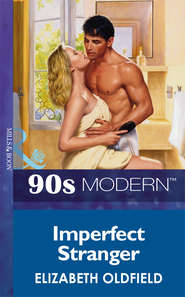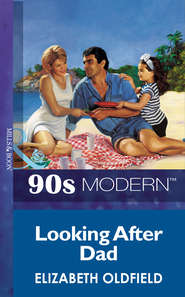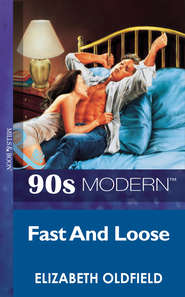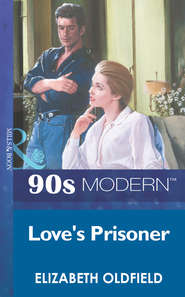По всем вопросам обращайтесь на: info@litportal.ru
(©) 2003-2024.
✖
Reluctant Father
Автор
Год написания книги
2018
Настройки чтения
Размер шрифта
Высота строк
Поля
Gifford’s arrival the previous day had had one plus, she thought wryly as she steered the pushchair out of the salon and started off along the spacious marblefloored lobby of Club Sesel. The interruption had made her think twice about wielding the scissors.
Past experience had shown that she was a ‘chopaholic’, so chances were her hair would have wound up looking as if it had been sheared by a lunatic with a chainsaw. Instead, her fringe was softly feathered, while the fall of burnished wheat-gold hair ended in a straight line at her shoulders. Cass tweaked at the silky black top which she wore with stone-coloured chinos. Today she looked stylish. Stylish enough to be mistaken for a hotel guest.
Club Sesel—Sesel was the Creole word for the Seychelles—catered for the wealthy. Guests stayed in individual granite bungalows which were discreetly sited amidst landscaped hillside gardens full of tropical blooms, ate in a chandeliered dining hail and could browse in the designer outlets which lined the lobby. She swung a look around. The lobby and shops were currently deserted. In general, there seemed to be few guests.
Reaching the gift shop, Cass stopped to study a window display which featured exclusive beachwear and mother-of-pearl jewellery arranged around a pair of polished coco de mer nuts. The huge nuts, which had a suggestively intimate female shape, were reputed to grow only in the Seychelles. These days restricted numbers were sold as expensive souvenirs, though in the past their kernels had been regularly ground up and used as an aphrodisiac.
A shadow clouded her blue eyes. There had been no need for aphrodisiacs when she and Gifford had met. Like their emotional rapport, the sexual attraction had been instant and compelling. And when they had made love it had been a passionate explosion of feeling which—
Her gaze swung sideways. A door bearing the word ‘Manager’ in gold letters had been opened, drawing her attention, but the man who had started to come out had swivelled and was disappearing inside again. As the door clicked shut behind him, Cass frowned. With wellgroomed fair hair, and wearing a silver-grey gabardine suit, he had looked suspiciously like Kirk Weber. She did not know where the South African stayed when he came to the island—nor had she been aware that he was here now—but Club Sesel would be handy for him.
Setting off again, she negotiated the buggy down a couple of shallow steps and out into the dazzling sunshine of the paved forecourt. Could Kirk’s presence mean he was about to finalise his purchase of the Forgotten Eden? she wondered as she slid on her dark glasses. She crossed mental fingers. She hoped so.
‘Yoo-hoo, Cass!’ a voice shrilled, and when she turned she saw a woman with short, gel-slicked auburn hair and wearing a gold lamé swimsuit waving at her from the far side of the small kidney-shaped swimming pool.
‘Hello, Veronica,’ she called back, smiling, and waited as the redhead teetered towards her on high goldsandalled heels.
Over the past two weeks, Veronica Milne had become a regular visitor to the Forgotten Eden. She would arrive in her hire-car around midday or in the evening, pick at her meal, then switch to sit at the bar where she would make eyes at Jules Adonis, the Seychellois barman who, with clean-cut looks, long, sun-lightened dreadlocks and a beguiling white smile, lived up to his surname. A surname which was surprisingly common in the islands.
If the baby happened to be around, she also made a big fuss of him.
A thin, twittery woman who talked non-stop, Veronica was hard going after the first five minutes—but Cass felt sorry for her. Behind the determinedly bright expression, she sensed a lost soul.
‘Just thought I’d tell you that I shall be along for lunch today,’ Veronica said. ‘Will Jules be there?’
‘He should be, though he has been known to sleep in and not wake up until it’s too late. Or forget which day it is,’ she said ruefully.
‘He’s such a heartthrob. Like this little fellow,’ the redhead declared, stretching down a hand to tickle the baby’s tummy.
Jack wriggled and giggled.
‘Do you have children?’ Cass enquired.
Veronica straightened. ‘No. I run my own fashion boutique—we sell only the best names-and there’s never been time to fit in a family. And now I’m divorced; the decree absolute came through last month. This is the first time I’ve been on holiday on my own. The first time I’ll go back to an empty house.’ She looked down at her noticeably denuded wedding-ring finger, though her other fingers were banded with rings of all shapes and sizes. ‘Of course, I could always marry again and have a baby. I’m only just into my forties, so it isn’t too late.’
‘I suppose not,’ Cass said, and hoped she did not sound doubtful.
‘I think Jules fancies me,’ Veronica declared, and lowered her voice into a giggly, conspiratorial whisper. ‘I fancy him, too.’
Cass felt a stab of concern. The woman might sport a trendy elf-in-a-rainstorm hairstyle and wear glamorous clothes, but rather than ‘just into’ her forties she looked more in her mid-forties, if not heading towards fifty. Jules was twenty-five.
He was also a happy-go-lucky Romeo who flirted with females—any female—out of habit and on autopilot. She had assumed this was glaringly obvious, but perhaps Veronica preferred not to see? Newly divorced, she could be feeling adrift and eager for male attention. Too eager.
‘Jules has a girlfriend,’ Cass said gently, not wanting her to get hurt. ‘In fact, he has several. I must go. I look forward to seeing you later. Goodbye.’
‘Bye, bye,’ Veronica trilled; but she was smiling at Jack and waving.
Cass pushed the buggy up the hotel’s sloping drive and out onto the hard-baked red earth of the road. She had spent most of last night tossing and turning and thinking about Gifford, and as she set off for the Forgotten Eden her mind returned to him again.
Yesterday, her reaction to his exit from the restaurant had been, Good riddance! But it had been a knee-jerk reaction. And he had not fled the island. A distant glimmer of lights from the bungalow the previous evening, plus the slam of a door this morning, had indicated that he remained in residence.
She frowned. Whilst becoming a single parent had never featured in her scheme of things—heaven forbid!—she had coped with all the various traumas and got her life back on track. Plans had been made for the future. But now Gifford had appeared and thrown everything into confusion.
‘I was going to send your daddy photographs of you on your first birthday, she said, speaking to the baby who sat in the pushchair. ‘And if he didn’t reply I was going to send another batch when you reached two. Then, if that failed to produce a response, I intended to take you over to the States, plop you on the middle of his office desk and say, Hey, buster, I’d like to introduce your son and heir. That would’ve concentrated his mind, yes?’
Jack clapped small, starfished hands—his latest trick.
‘I don’t expect him to be an every-day daddy,’ Cass continued, becoming grave, ‘but I believe that every child has the right to know its father, and I want him to show a respectable amount of care and consideration. Like remembering your birthdays and taking you on the occasional holiday when you’re a big boy, and being available at times when you particularly need a dad.’
‘Blah.’ her listener said.
‘I was going to tell him all this when you were two. When you’d be starting to realise that other children have daddies and wondering where yours had got to. Only he’s turned up now.’
The baby stuck his thumb in his mouth and sucked noisily.
There could, of course, be a second reason for Gifford’s abrupt departure from the restaurant, Cass reflected. He might have been eager to return to a companion. A female companion, whom he had left in bed. He was a red-blooded male with all the usual appetites—as she could confirm, she thought astringently—and whilst he might be here to convalesce she could not imagine him spending the days alone and doing nothing. So it seemed possible that he had a woman in tow.
Halting, she lowered the buggy into its recline position, laid down her son and drew forward the hood. Jack’s chubby arms and legs were lightly tanned, but she was wary of him getting too much sun.
Cass walked on. Might Gifford’s companion be the glamorous Imogen Sales? The more she thought about his attitude the previous day, the more she felt there had been an air of strained secrecy about him. He had been hiding something. What? The fact that he had come to the Seychelles with the actress who had followed her into his arms and his affections with insulting, hurtful speed?
She pushed the buggy down into a crater of a pothole and up out of it again. A few months ago she had seen the American woman in a TV film. Cass grimaced. She had had the kind of shiny, swinging raven-black bob which was more usually seen in shampoo adverts, a serenely aloof face and, wearing a succession of slinky numbers, had been disgustingly slim. Imogen had also, she thought cattily, displayed an inescapable need to pose and possessed all the acting skills of cardboard.
Her expression shadowed. She did not welcome the idea of producing Jack and discussing what were essentially private matters with Imogen Sales around Yet, even if the actress or some other woman was living with Gifford in the villa, it was vital that they should talk. For her son’s sake, lines of communication needed to be established.
Cass strode on. Once upon a time, she had considered herself to be a good judge of character. She had been convinced that her lover was conscientious, reliable, trustworthy, but it had been all smoke and mirrors.
‘How could I have been so wrong?’ she muttered, and fell silent, bombarded with memories of the past…
It had been Henry Dexter, Stephen’s elderly father and, at that time, head of the company, who had first brought the Tait-Hill Corporation to her attention.
‘Those two will go far,’ he had declared, marching into his son’s office one morning to thrust a trade magazine at him. ‘Read the article and see how ambitious they are, how well informed and on the ball.’ He had frowned. ‘Take note of how hard they work.’
‘Yes, Pa,’ Stephen had replied obediently, but he had put the magazine aside and not bothered.
Cass had read the article; as a new and keen secretary she’d read all the memos and reports which the young man was supposed to read but often did not. It had told how two Americans, Gifford Tait and Bruce Hill, had once been skiers representing their country at worldclass level and winning medals. Both business graduates, they had seen a need in their sport for better-designed equipment and decided to satisfy it.
Over the next few years, the old man’s prophecy had come true. Tait-Hill had flourished, widening their product range to other sports and developing an eclectic spread of business interests which included property, a hot-air-balloon company and a million-dollar stake in a computer software manufacturer.
However, after Henry suffered a stroke and was forced to retire, Dexter’s had gone downhill. A traditional, slightly old-fashioned firm whose name on cricket bats, tennis rackets and running shoes guaranteed top quality, its future had begun to look shaky. Then a letter had been received from Tait-Hill, suggesting talks about a rescue package and possible buy-out.
Despite Stephen’s claim that he could turn things around—and much to his chagrin—his father had decreed that Tait-Hill must be allowed to vet the company for potential acquisition. A short while later, Gifford had flown in.
After a week spent poring over balance sheets at the London headquarters and assessing financial information—information which Cass had invariably provided—he had requested that she give him a crash course on the workings of Dexter’s and provide details of the company’s forward plans.
‘Why me?’ she asked, thinking of how she had left Stephen sulking in his office.
‘Because you’re the smart kid around here.’ Gifford grinned at her across the desk. ‘And because I like you.’











